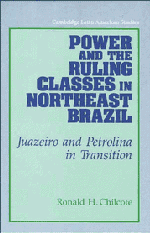Book contents
- Frontmatter
- Contents
- List of tables and figures
- Preface
- PART I THE TRADITIONAL SERTÃO
- 1 The background
- 2 The structure of power and the ruling class
- 3 Juazeiro: cohesion and factionalism
- 4 Petrolina: patriarchy and family dominance
- 5 The ruling class and the polity
- 6 The ruling class and the economy
- 7 The ruling class in civic and social life
- 8 Ideology
- 9 Development and underdevelopment
- 10 Participation, mobilization, and conflict
- PART II THE SERTÃO REVISITED
- Appendix
- Bibliography
- Index
- CAMBRIDGE LATIN AMERICAN STUDIES
10 - Participation, mobilization, and conflict
from PART I - THE TRADITIONAL SERTÃO
Published online by Cambridge University Press: 30 September 2009
- Frontmatter
- Contents
- List of tables and figures
- Preface
- PART I THE TRADITIONAL SERTÃO
- 1 The background
- 2 The structure of power and the ruling class
- 3 Juazeiro: cohesion and factionalism
- 4 Petrolina: patriarchy and family dominance
- 5 The ruling class and the polity
- 6 The ruling class and the economy
- 7 The ruling class in civic and social life
- 8 Ideology
- 9 Development and underdevelopment
- 10 Participation, mobilization, and conflict
- PART II THE SERTÃO REVISITED
- Appendix
- Bibliography
- Index
- CAMBRIDGE LATIN AMERICAN STUDIES
Summary
Concerted efforts to integrate rural and urban life in Brazil began with the Vargas regime in the 1930s and intensified after Word War II, partially through government regulation and partially through the activities of several national parties whose networks reached into the hinterland. Under the military regimes after 1964, greater federal control was imposed upon local areas, and a contrived system of government and opposition parties served as a means whereby the military could control political participation. In form the military had modeled its two-party system after that of the United States, but in practice participatory democracy was subject to severe constraints and limitations. Prior to the military takeover, various political and economic forces had been involved in struggles over popular issues such as extension and expansion of rights and services to all people and mobilization of national sentiment against foreign aggression and imperialism.
Participation and democracy are terms common to the study of politics in the United States and usually refer to the practice of pluralism – that is, competition among groups and individuals for power and influence over decisions and policies. Samuel Huntington limits his definition of “participation” to influence on governmental decision making by private citizens; he excludes the activities of political professionals such as government officials, party officials, political candidates, and professional lobbyists. Further, he focuses on governmental activity, so that a strike that influences government to increase wages for public employees is political participation whereas a strike aimed at management of a private corporation is not.
- Type
- Chapter
- Information
- Power and the Ruling Classes in Northeast BrazilJuazeiro and Petrolina in Transition, pp. 230 - 248Publisher: Cambridge University PressPrint publication year: 1990



